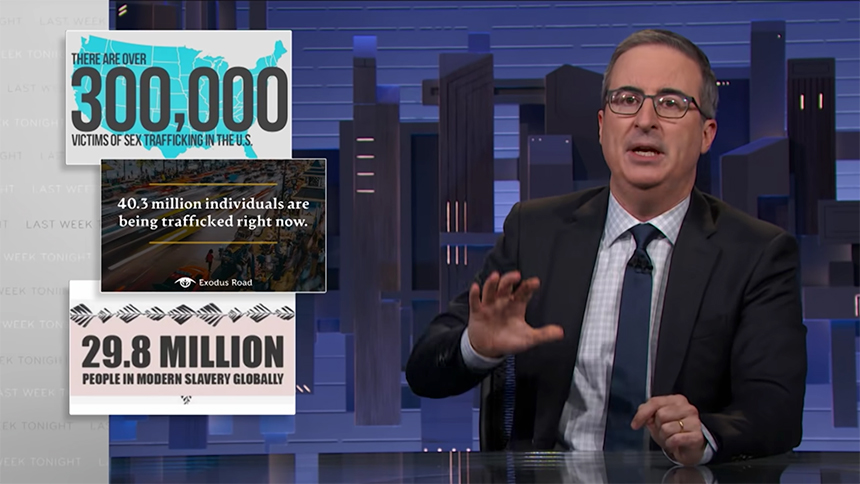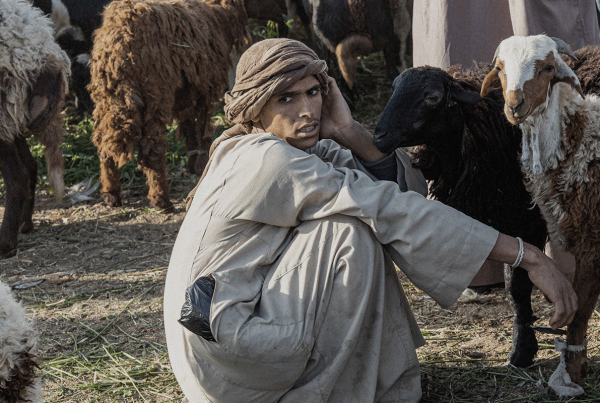Recently, John Oliver produced a segment on his show Last Week Tonight on HBO about sex work — advocating for the decriminalization of sex work in the United States. A graphic from The Exodus Road was even highlighted depicting a statistic on global human trafficking (12:05). And, while we believe that Oliver brings some excellent points about the complex issue to mainstream audiences (at the time of writing the segment has nearly 3 million views), he also fails to bring forward the voices of survivors of sex trafficking in a meaningful way. As a nonprofit fighting sex trafficking for more than a decade, we are adding our voice to the controversy that the segment has since sparked.

Most notably, the response from survivor advocates in the anti-trafficking space has been opposed to Oliver’s segment. The nonprofit World Without Exploitation produced a powerful open-letter video piece by survivors of the sex trade, which states that Oliver’s take on making sex work decriminalized benefits pimps and johns while hurting those being exploited. Among other things, they call out Oliver’s comparison of sex work to working at Subway. The hashtag #spokenlikeajohn has been used on social media to depict that Oliver’s position on the issue is similar to the position that a customer, or “john”, would have.
Others have also joined the controversy in support of survivors. Ashley Judd called him “insensitive” and posted the nonprofit’s video with a caption that said: “Survivors listened to John Oliver. Now it’s time for John Oliver to #ListenToSurvivors.” The NY Daily featured an Op-Ed entitled, “A note about prostitution to a John (Oliver, that is),” which slams Oliver’s misrepresentation of the issue and potential solutions.
The controversy on Oliver’s Youtube channel comments seems to contain large support of the segment with over 100k comments. Viewers are predominantly in support of the rights of sex workers and give Oliver loud praise in his tackling of the nuanced issue itself.
At The Exodus Road, we know this conversation is an important one. The legalization or decriminalization of sex work has massive implications on laws, industries, and most importantly, on the men and women who are directly impacted — as customers, pimps, or those providing sexual services (whether by force or by choice). And while the conversation is critical, John Oliver got a few things right and a few things wrong in his segment.
What John Oliver Got Right About Sex Work and Sex Trafficking
Perhaps the strongest and most valuable point Oliver makes throughout the segment is the damage that conflating “sex workers” with “sex trafficking victims” causes. We have seen this time and again. Adult, consensual sex workers are different than human trafficking victims – individuals who are minors or who are experiencing “force, fraud, or coercion.”
The overlap of these two groups is confusing and difficult to parse out in reality and on the streets. While we would say that there remain levels of exploitation throughout almost the entire spectrum of sex work, they are not the same and classifying all sex workers as sex trafficking victims is damaging, inaccurate and disempowering to some. Conflating the two groups shuts down productive conversation.
We also appreciate how he states that human trafficking of any kind is not acceptable and should be stopped. This statement is irrefutable and a point on which everyone in this conversation agrees.
The issue of sex work, globally and within the U.S., is complex and nuanced. From a legal standpoint, it’s treated differently from state to state in America. Oliver also does an excellent job depicting the oftentimes illogical and unfair treatment of sex workers within the legal system here in the U.S.; sex workers are often arrested and face extreme charges that can dramatically impact their futures without being provided services or being treated with dignity.
He also does a good job highlighting some of the unethical and unfair practices by law enforcement during undercover operations. As an organization that partners with and trains law enforcement around the world in fighting human trafficking crime, we can verify that police, at least overseas, will sometimes have sex with sex workers in order to gather evidence of a crime. This is unethical and is a practice we at The Exodus Road train strongly against. We require that our investigators find other methods for gathering evidence that do not involve sexual contact of any kind with the individuals being trafficked. Undercover operations globally are often far from victim-centered or trauma-informed; this is an area where great improvement is needed both in the U.S. and abroad.
Oliver also does a good job explaining the three different “solutions” to how we handle sex work as a society – the Nordic Model (making it illegal from the buyer’s side only), legalization (highly regulating the industry), or decriminalization (eliminating the criminal component of sex work). He also states that supporting those who are engaging in sex work because of economic hardship is a broader issue that also needs to be addressed. We agree.
What John Oliver Got Wrong About Sex Work and Sex Trafficking
While the segment brings some key realities of this complex issue into mainstream media, it also falls short in several critical areas, which is why it’s created such controversy.
The nature with which he speaks of sex work is insensitive — most importantly to sex trafficking survivors themselves (along with the men and women who are in sex work not by force). The comparison of sex work to working at Subway making sandwiches is flippant and privileged. To a certain degree, yes, “work is work,” however, one survivor makes clear in the open letter the issue with his comparison: “As far as being sold in the sex trade as having a job in Subway making sandwiches, I wonder if the Subway employees have to deal with such occupational hazards as rape and sodomy? Hilarious, right John?”
Oliver states the need to listen to sex workers themselves as the chief experts in this issue, but we wonder if Oliver’s team ran the content by survivor advocates before airing.
Another failure is the conflation of sex trafficking with all forms of human trafficking. For example, Oliver uses The Exodus Road’s website graphic that shares the Global Slavery Index statistic that 40 million people are affected by trafficking. 62% of these victims are in forced labor, 30% are in forced marriage and an estimated 8% are in forced sex work. These are critically important differentiations when talking about human trafficking.
Here’s an article that helps clarify what the different types of human trafficking are and how they differ.
Perhaps the largest miss from Oliver is that in his case made for decriminalization, he neglects to address the benefits that decriminalization would have for pimps, johns, and brothel owners – oftentimes the very individuals who are profiting the most from sex work. The argument is also made primarily from the lens of consensual sex workers and what would presumably benefit them while little attention is given to those who are sex trafficking victims. And, while Oliver differentiated the two groups, to have a conversation about an industry with rampant exploitation and not include the voices of survivors of it is a major miss.
The controversy around how to move forward in the sex industry in ways that will protect the most vulnerable is a critical conversation that needs to be engaged on all levels of the private and public sectors.
To see positive reform, we need to hear from both consensual sex workers and sex trafficking victims. We need to understand their experiences, the factors that led to their place in the sex trade by choice or force, and their opinions on whether decriminalization would truly empower freedom or not. Additionally, Americans need to better understand what sex work and sex trafficking are and how they typically happen in the U.S. and abroad.
Moving forward as a society is as complex and nuanced as the issue itself, but this is a conversation that needs to continue for the safety, protection, and dignity of all involved in the sex industry. And it’s a conversation that demands listening first to all of those with lived experience.
If you’re wondering where you can start with this complex issue, understanding is always a great first step. At The Exodus Road, we’ve developed a free, online training program to help educate viewers concerning what human trafficking is, what are the different types of trafficking (sex and labor), how to recognize signs of potential trafficking, what it looks like in the U.S., and what you can do about it in your community. Check out TraffickWatch Academy: U.S. today.






